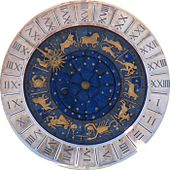| Part of a series on |
| Hinduism |
|---|
 |
| Astrology |
|---|
 |
| Background |
| Traditions |
| Branches |
| Astrological signs |
| Symbols |
Hindu astrology, also called Indian astrology, Jyotisha (Sanskrit: ज्योतिष, romanized: jyotiṣa; from jyót 'light, heavenly body') and, more recently, Vedic astrology, is the traditional Hindu system of astrology. It is one of the six auxiliary disciplines in Hinduism that is connected with the study of the Vedas.
The Vedanga Jyotisha is one of the earliest texts about astronomy within the Vedas.[1][2][3][4] Some scholars believe that the horoscopic astrology practised in the Indian subcontinent came from Hellenistic influences.[5][6] However, this is a point of intense debate, and other scholars believe that Jyotisha developed independently, although it may have interacted with Greek astrology.[7]
The scientific consensus is that astrology is a pseudoscience and has consistently failed experimental and theoretical verification.[8][9][10][11][12]
- ^ Thompson, Richard L. (2004). Vedic Cosmography and Astronomy. pp. 9–240.
- ^ Jha, Parmeshwar (1988). Āryabhaṭa I and his contributions to mathematics. p. 282.
- ^ Puttaswamy, T. K. (2012). Mathematical Achievements of Pre-Modern Indian Mathematicians. p. 1.
- ^ Witzel 2001.
- ^ Pingree 1981, pp. 67ff, 81ff, 101ff.
- ^ Samuel 2010, p. 81.
- ^ Tripathi, Vijaya Narayan (2008), "Astrology in India", in Selin, Helaine (ed.), Encyclopaedia of the History of Science, Technology, and Medicine in Non-Western Cultures, Dordrecht: Springer Netherlands, pp. 264–267, doi:10.1007/978-1-4020-4425-0_9749, ISBN 978-1-4020-4425-0, archived from the original on 7 March 2023, retrieved 5 November 2020
- ^ Thagard, Paul R. (1978). "Why Astrology is a Pseudoscience" (PDF). Proceedings of the Biennial Meeting of the Philosophy of Science Association. 1 (1): 223–234. doi:10.1086/psaprocbienmeetp.1978.1.192639. S2CID 147050929. Archived (PDF) from the original on 28 August 2017. Retrieved 13 June 2017.
- ^ Sven Ove Hansson; Edward N. Zalta. "Science and Pseudo-Science". Stanford Encyclopedia of Philosophy. Archived from the original on 5 September 2015. Retrieved 6 July 2012.
- ^ "Astronomical Pseudo-Science: A Skeptic's Resource List". Astronomical Society of the Pacific. Archived from the original on 30 December 2011. Retrieved 13 June 2017.
- ^ Hartmann, P.; Reuter, M.; Nyborga, H. (May 2006). "The relationship between date of birth and individual differences in personality and general intelligence: A large-scale study". Personality and Individual Differences. 40 (7): 1349–1362. doi:10.1016/j.paid.2005.11.017.
To optimise the chances of finding even remote relationships between date of birth and individual differences in personality and intelligence we further applied two different strategies. The first one was based on the common chronological concept of time (e.g. month of birth and season of birth). The second strategy was based on the (pseudo-scientific) concept of astrology (e.g. Sun Signs, The Elements, and astrological gender), as discussed in the book Astrology: Science or superstition? by Eysenck and Nias (1982).
- ^ Cite error: The named reference
Narlikar-CUPwas invoked but never defined (see the help page).